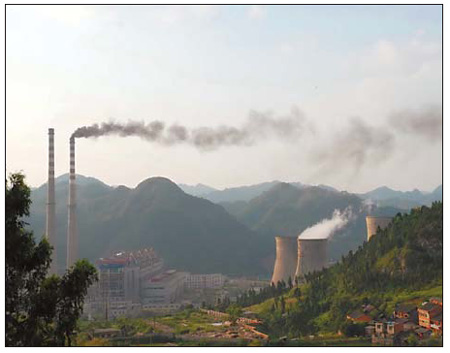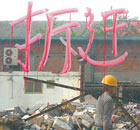Economy
Growing costs: Dilemmas, struggles facing China
By Hu Yinan, Li Jing and Wang Shanshan (China Daily)
Updated: 2010-01-22 07:49
 |
Large Medium Small |

A power factory in the scenic city of Kaili, Guizhou province, emits black smoke every afternoon, causing heavy pollution. [Qi Ta/China Daily]
|
Zhang lives close to Dianchi Lake in Kunming, the country's sixth largest freshwater lake. It was once regarded as the "pearl" of the Yunnan-Guizhou Plateau, famed for its crystal clear waters. Now, after years of industrial pollution, the lake is covered with a thick layer of blue algae and emits an unbearable odor.
"I became an orphan when I was seven years old. I once lived on fishing from Dianchi and I have always seen the lake as my mother. I want to give something back to her," said Zhang, who visits the lake every week to check the water quality.
But his passion to protect the once beautiful attraction had made him a troublemaker in the eyes of some people, especially the rogue factory bosses, illegal quarry owners and timber thieves he has been at war with since 1994.
Zhang has suffered for his efforts. He said he has received several threats from companies, while his wife and daughter left him after he went bankrupt filing lawsuits against polluters.
He has also discovered that one man cannot reverse the tide of environmental degradation caused by a massive industrial boom that started in the 1980s.
Almost a third of all the economic output of Yunnan - a largely impoverished province with a population of 44.5 million - is concentrated in the drainage area of Dianchi Lake, according to provincial authorities.
|
||||
Grade 5 (too dangerous for human contact).
The local government has since 2008 invested about 12 billion yuan ($1.7 billion) into cleaning up the lake. However, the water is not expected to return to its former glory until 2020, by which time more than 100 billion yuan will have been spent by authorities to remove the pollution, said Li Kunmin, director of the city's Dianchi Lake management bureau.
Dianchi Lake epitomizes the cost China's rapid development and economic growth: Environmental and ecological deterioration.
The country's economy has expanded on average 9.7 percent every year for three decades. The rate of growth has forced China to deal with the kind of environmental woes industrialized countries once faced, only over a shorter period of time. Developed countries began addressing ecological concerns when their per capita GDP reached $20,000, but China must now achieve the same results when its per capital GDP is only about $3,000, environment officials said.
Faced with mounting challenges in recent years, the central government is determined that green growth is the only way to ensure future prosperity. As Zhou Shengxian, the environment minister, put it: "It is a disgraceful lifestyle to drive a BMW but have only dirty water to drink."
The success in imbuing the green growth concept in the minds of local government officials will determine whether China can solve its development dilemma.
To prevent the nation's economy from suffering further from the global financial crisis, local authorities are once again blindly pushing through polluting projects rather than fueling "green GDP".
A pilot project to calculate green GDP - a system designed to gauge real economic growth by deducting the cost of environmental pollution - was conducted in 2005 by the Ministry of Environmental Protection (then-State Environmental Protection Administration) and National Statistics Bureau.
The findings were released the following year and showed environmental damage had cost the nation almost 512 billion yuan in 2004, about 3 percent of that year's GDP.
No subsequent reports have been released and analysts say this is because local governments are opposed to the publication of disappointing results.
Nobel Prize-winning economist Joseph Stiglitz recently called on people to "get away from GDP fetishism and to understand the limits of it". GDP alone is insufficient in truly measuring a country's economic health and sustainability, while human wellbeing must be considered, he said.








